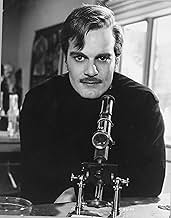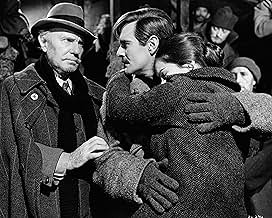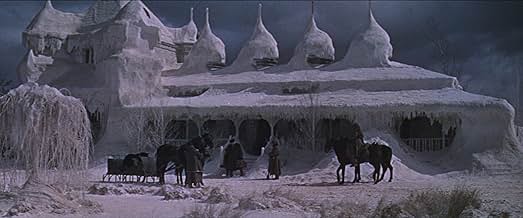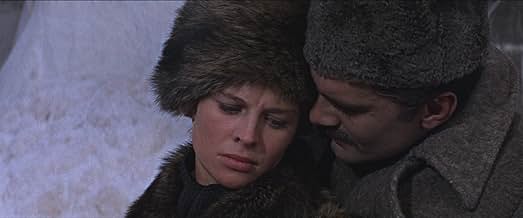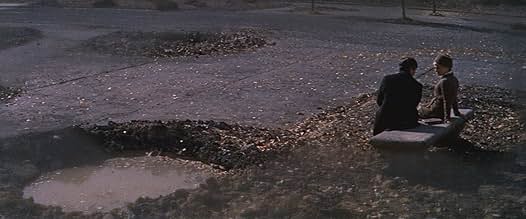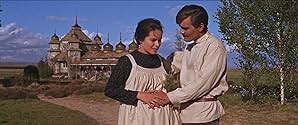The life of a Russian physician and poet who, although married to another, falls in love with a political activist's wife and experiences hardship during World War I and then the October Rev... Read allThe life of a Russian physician and poet who, although married to another, falls in love with a political activist's wife and experiences hardship during World War I and then the October Revolution.The life of a Russian physician and poet who, although married to another, falls in love with a political activist's wife and experiences hardship during World War I and then the October Revolution.
- Won 5 Oscars
- 21 wins & 13 nominations total
- Liberius
- (as Gerard Tichy)
- Director
- Writers
- All cast & crew
- Production, box office & more at IMDbPro
Summary
Featured reviews
As materialists (matter precedes spirit, not vice versa), the Bolsheviks believed that they had found the holy grail of human progress in Marxism-Leninism, and were now able to assume the reins of history in their own hands. They believed that their violence was not only justified, but necessary, oblivious to the fact that they, too, somehow felt the angel of medieval teleology smiling over their shoulders.
In contrast to the Bolsheviks, Zhivago's ethos, if he had one, was almost identical to Kant's `categorical imperative,' which had just one axiom: treat people as ends in themselves, and not as ends to a mean. There couldn't be a sharper moral contrast.
There's a fabulous scene midway through the movie that highlights the difference in moral attitude. Dr. Zhivago confronts a communist functionary who has ordered the destruction of a village, a hamlet suspected of aiding the Mensheviks by selling them horses. To the Bolsheviks, if you weren't 100 percent behind them, you were a `counterrevolutionary,' sorta like Dubya's idea that you're either for us, or against us. And so Strelnikov, the passionate Bolshevik, glibly justifies his actions to Dr. Zhivago as easy as if he were tossing his hair aside, saying that the annihilation of the village, however cruel, is necessary to make a point. Zhivago replies: `Your point; their village.'
I love this film, a timeless epic. If there's a more beautiful heroine in all of movie-making history than Julie Christie (Lara), I'm not aware of it. And Omar Sharif is stunning as Iuri Zhivago, who heals the body with emetics, scalpels, antiseptic, and gauze, while he heals the soul with his poetry. Although the movie is three hours and 20 minutes long, the cinematography is so efficient, evocative, and densely layered that one hardly notices. This is, in my opinion, one of the best films of all time.
Another worthless criticism: It's too slow, too long. Phooey. Some movies have to be slow and long to tell a big, detailed story.
If one is going to criticize this film, I suggest the following: 1. Screenwriter Robert Bolt's kneading of the characters' lives into the progression of the Russian revolution is sometimes at odds with actual chronology, so that anyone familiar with this period cringes from time to time. In one scene, in order to identify for the viewer the historical point that has been reached, a character blurts out (I paraphrase, but only very slightly): "Lenin is in Moscow! Civil war has started!" Neither could have been true at that moment in the narrative. Bolt could have polished his distillation of the novel, but who, apart from direct participants, can ever know why such gaffes occur in high-pressure multi-million-dollar productions? 2. This is yet another movie about a writer, in this case a beloved but politically controversial poet, not a word of whose poetry is revealed to the audience (except for the title of one poem, "Lara," after the woman he loves). Other major movies, including Julia (1977) and Wonder Boys (2000) also commit this offense. Ironically, one exception is the campy and rather dreary Isn't She Great (2000), about trash novelist Jacqueline Susann, which actually explores the act of writing! 3. The physical reproduction of the era is uneven. Some moments are too clean. One example: When Zhivago slides open the door of the ostensibly foul-smelling box car in which he and his family have been traveling for weeks packed alongside filthy, probably lice-ridden passengers, he looks too healthy, scrubbed and well rested. This and other moments stand out because they occur in the context of innumerable convincing depictions such as mud-filled wartime trenches, a looted and vandalized city mansion, or a half-frozen refugee tramping stiffly over the ice of a frozen lake. 4. It is said that Russian viewers laugh at the onion-domed house where the lovers hide from the Bolsheviks. Russian churches have onion domes, they say, but not houses. Granted. But I'd like to think that the person who built this particular house was an eccentric and got away with the concept because the house was in an isolated rural area away from the prying eyes of the "architecture police."
In any case, the emotional truths underlying the occasional inadequate or wrongheaded representations register powerfully. The grand-scale perspective gives a sense of the tumult of the times; vivid and memorable casting choices keep us fascinated with the characters and concentrated upon them; you feel the terrible losses people suffered when history so rudely pulled the rug out from under them; you are reminded of the pitiless cruelty of war and the depths to which people in its grip can descend; and how despite the tragedies of our history, we go on no matter what. David Lean had a great gift for injecting bold images at just the right moment. And he had the same gift for the perfectly timed sound effect, often occurring at an edit point. At Zhivago's end one feels a tremendous sense of sadness and loss but hope for the future. Considering the international political climate of the time of its release, it treats the Russian Revolution with enough detachment to illuminate both sides of the political divide. In other words, it doesn't propagandize for either side.
This was the first major Hollywood treatment of the Russian Revolution, was still running in theatres around the world two and three years after its initial release, despite dismissals from most of the major film critics of the time. Its popularity came from word of mouth, i.e., from the public's genuine love of the story and its striking, technically expert presentation. Interestingly, Zhivago as a box office blockbuster was second only to The Sound of Music, released the same year. Both films told the story of individuals faced with historically recent Old World political upheavals (communism/fascism). Furthermore, the soundtrack album of each film took on a life of its own, selling millions of copies. And why not also add that central to the success of each film was an English actress named Julie (Christie as Lara/Andrews as Maria). How many times have you heard of or personally known a woman under 40 with the previously uncommon name of Lara? Guess why that name became popular in the 60's and afterward?
This is a great movie. It is long. It is memorable. But it is neither a soap opera nor foolish. It is not a documentary of Russia in WW1 and then going communist. It is a life and love story against a backdrop of these things. Critics should accept what a movie is about, rather than what they wish it were about.
A movie like this, like all epics, gets a chance to show detail and immerse you in the environment. I never felt so chilled, and so bothered by the wind--all in my head--as during watching this film. In that way, actually feeling like you were there, has only been as realized for me in one other film, "The Last Picture Show", where the feel of chill and desolation in that movie is pervasive.
All performances are great, don't let the idiots tell you otherwise. I read that many felt the Sharif was wrong, or expressionless. Sorry, but that is his character. He is trying to be a professional physician, and keep the appropriate facade in the face of changes that are absolutely surreal. Christie possesses the kind of visual magnetism that makes the infatuation of Zhivago plausible. Rod Steiger, who is guilty of preposterous performances in other films, hits the keys of his performance so perfectly you never disbelieve him. Lesser actors would have just made him the perverted rapist that he is, but nothing more to add to the dynamics of his personality. Courtney as high-minded, full of foolishness, and in the end, blinded by frustration and I believe a touch of madness.
Another thing I found splendid about this film was how it illuminated how evil, twisted, and preposterous the scheme of communism truly is. In this film, and of course in history, all the wealth of the rich is removed, and redistributed. This fixes nothing. What it does allow for, in its BS concepts that all men are the same and are all "comrades", is that you don't rise due to merit, you rise because of who you know. The movie time and again shows complete idiots in charge of things...the "managers" of the old Zhivago house who have converted into mass housing for the jealous poor who hate Zhivago and his family. They couldn't be more useless. The leaders of various combat units. The guy who tells people on the disgusting train about the "features" of the accommodations. Yes, in communist countries, the cream never does rise to the top. The working class does whatever is told, just for the benefit of the scraps and their survival. Lara at one point states something like "it's a horrible time to be alive"....and nothing is closer to the truth than that.
Again, not documentary or a wartime story, but its concepts and truths are right there.
The production, of course, top notch. Watch it, take a break or two and soak it all up. It is a special kind of movie, back when they made such a thing.
"Doctor Zhivago" is definitely one of his most outstanding works, a film that breathes with life, and suffers with passion. Neither, though, of the credited people can take as much credit for it, as David Lean. Omar Sharif delivers one of his best performances of his career, Julie Christie has never been as stunning, or Rod Steiger as Komarovsky or Tom Courtenay as Antipov ever left more memorable performances than these ones. Not even Maurice Jarre, who composed one of the most unforgettable themes in film history, or Robert Bolt, for his skillful adaptation on Pasternak's difficult novel, not even Freddy Young's cinematography, can rise above the vibration of genius, which is David Lean. We almost feel the complexity of the universe collapsing on us with a mad power that we instantly become part of it, and fall in love with all its particles.
For those who haven't seen the film, this might make little sense, and it can give a misleading understanding of what one is to expect. "Doctor Zhivago" is a poet, who at the beginning of the 20th Century is caught in the historical Bolshevik revolution. An outstanding doctor, married to his childhood friend, Tonya (Geraldine Chaplin in a warm performance), finds that there is beauty beyond deceit, love beyond commitment, by starting an affair with an enigmatic lady which appears often in his path in the most unnoticeable of moments. Their destiny is as confused as Russia in the turmoil started by the Reds, it is shaped by history without their approval. There is no solution for a country that abandoned its passions in its desire of self-improvement, just as for the two lovers, which find themselves abandoned in the middle of the Siberian taiga.
This is a slow film and for the good reasons. We are allowed to breathe the story, to give it momentum, and to judge it from within, as if the choices were not Yury's, Lara's or Tonya's, but our own creation. And this is the brilliance of Lean's direction. The story transcends time and space, and it melts within the triviality of our life. Beyond it, we are left with nothing but love, pure and blindingly real.
Did you know
- TriviaThis movie wasn't shown in Russia until 1994.
- GoofsThe little girl who plays Tonya at Yuri's mother's funeral starts to cross herself in the Roman Catholic manner, but quickly corrects herself and finishes in the Russian Orthodox style.
- Quotes
Komarovski: Lara, I am determined to save you from a dreadful error. There are two kinds of men, and only two, and that young man is one kind. He is high-minded. He is pure. He is the kind of man that the world pretends to look up to and in fact despises. He is the kind of man who breeds unhappiness; particularly in women. Now, do you understand?
Lara: No.
Komarovski: I think you do. There's another kind. Not high-minded. Not pure. But alive. Now that your taste at this time should incline towards the juvenile is understandable. But for you to marry that boy would be a disaster. Because there's two kinds of women...
[Lara covers her ears, he forces her arms down]
Komarovski: There are two kinds of women and you - as we well know - are not the first kind.
[Lara slaps him, he slaps her back]
Komarovski: You, my dear, are a slut.
Lara: I am not!
Komarovski: We'll see.
- Alternate versionsWhen it was first released, the film originally ran 197 minutes. Early in its run, David Lean and editor Norman Savage shortened it to 180 minutes; this version was in circulation for years. By the mid-1990s, the uncut version was restored.
- ConnectionsEdited into Hollywood: The Dream Factory (1972)
Details
- Release date
- Countries of origin
- Official site
- Languages
- Also known as
- Doktor Živago
- Filming locations
- Morley Flats, Alberta, Canada(Frozen house longshots)
- Production companies
- See more company credits at IMDbPro
Box office
- Budget
- $11,000,000 (estimated)
- Gross US & Canada
- $111,721,910
- Gross worldwide
- $112,090,394
- Runtime3 hours 17 minutes
- Color
- Aspect ratio
- 2.35 : 1
Contribute to this page








